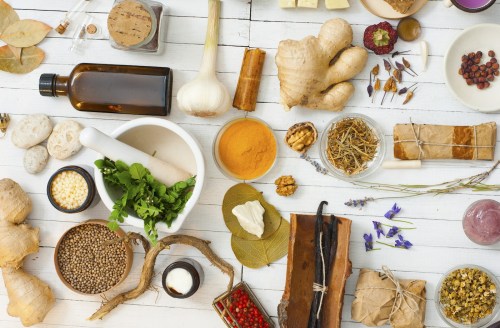Things we know are good for heart health: regular exercise, eating heart-friendly foods like salmon and avocado, and yeah, even having sex. (Score!) However, there’s one OG remedy that most herbalists would probably add to that list: hawthorn.
Looking at hawthorn’s roots takes us back as far as the first century AD, when it was reportedly first used medicinally to treat heart conditions and anxiety. Since then, the shrub’s leaves, tart berries and flowers have been a part of Chinese, European and Native American herbal medicine practices. With such a storied history, it’s not surprising the herb (including its leaves, stems, and berries), which is part of the rose family, is still used medicinally today. A rose by another name that could help your heart—how romantic!
Are there any legit hawthorn benefits I should know about?
This old-school remedy does actually have some pretty exciting health potential, especially when it comes to your ticker. “Because of their antioxidant content, taking hawthorn supplements have been shown to improve heart health,” says functional medicine expert Will Cole, DC. Hawthorn berries contain potent flavonoids, which act as an antioxidant that help protect your body (including your heart) from oxidative stress and damage by free radicals—both of which can lead to signs of premature aging and disease.
Dr. Cole says hawthorn supplements can also potentially reduce cardiovascular disease risk and improve circulation. Increased blood flow throughout the body can in turn help reduce bloating, which is why some herbalists recommend it for those kinds of issues. In one small study of 36 people, those who took hawthorn extract for ten weeks actually had lower diastolic blood pressure and less anxiety than those taking a magnesium supplement or placebo. (However, more research needs to be done for these findings to be fully conclusive.)
The herb might also be able to improve overall cardiac function. When examining over a dozen trials, researchers found hawthorn extract helped people with chronic heart failure be more active. “It was shown to help people exercise more, improve their exercise tolerance and make them feel better,” says Emilie Scott, MD.
Any downsides or limitations to hawthorn?
While research like this sounds promising, some doctors like Dr. Scott aren’t buying it yet. “There’s evidence that it can be helpful in cases, but it’s not as clearly studied,” Dr. Scott says. “Personally, I actually have not recommended it to a patient in my career.” Instead, she focuses on lifestyle changes in a patient’s diet and exercise regimen to boost heart health, in addition to traditional medical treatment.
As with any supplement, it’s important for people considering hawthorn to talk to their practitioner before trying it. “The issue with taking hawthorn along with traditional treatment is that it can interact with it,” Dr. Scott says, especially for people with a heart condition. She warns these supplements can interfere with beta-blockers, calcium channel blockers, or other heart, cholesterol and blood pressure drugs. Cole agrees on this front: “Since hawthorn helps to lower blood pressure, combining them with other blood pressure lowering medications can put you at risk for your blood pressure to drop too low,” he says.
However, Cole is still a fan of hawthorn. “Along with eating a clean, whole-foods based diet, hawthorn supplements [can be] a great way to add in additional support to lower your risk factors,” he says, such as for people who have high blood pressure or other markers of cardiovascular disease.
If you’re looking for natural remedies to treat anxiety, Dr. Scott adds that while there’s not an abundance of evidence proving it’s effective, hawthorn can be worth a try as long as you’re not on any clashing medications. (So again, talk to your doc before trying it.) Just be warned: per the NIH, hawthorn has been associated with some mild (but unpleasant) side effects like dizziness and nausea.
The short version: Hawthorn has lots of promise when it comes to helping out heart health, although more conclusive research is needed. But if you and your practitioner decide that it’s safe for you, well then, all the heart eyes emojis for you.
Looking for more natural remedies? Check out the wonders of ashwagandha and vitex.
Sign Up for Our Daily Newsletter
Get all the latest in wellness, trends, food, fitness, beauty, and more delivered right to your inbox.
Got it, you've been added to our email list.











